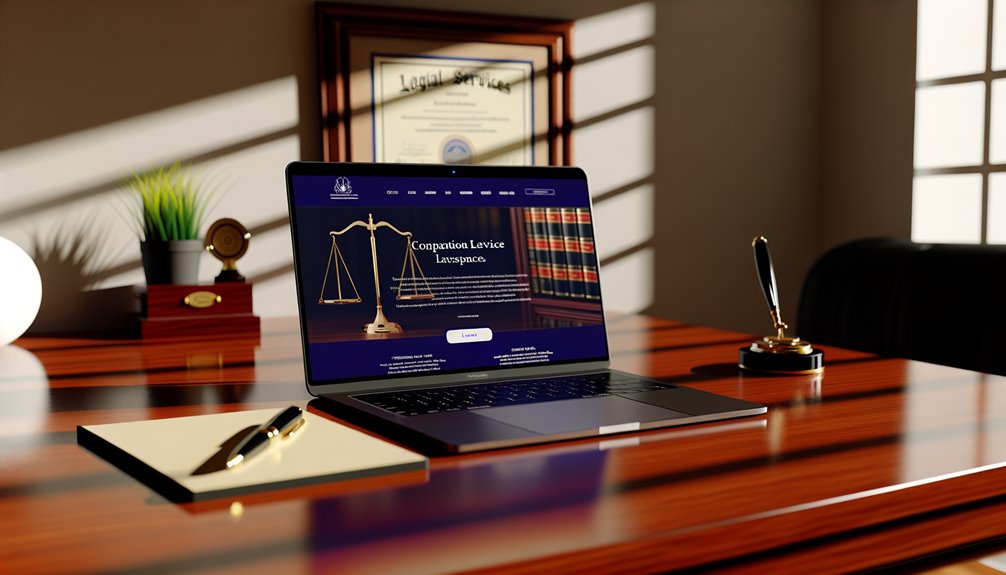Key-Features-Lawyer-Website

A successful lawyer website must prioritize user-friendly navigation to build trust and foster engagement. It should include compelling content that resonates with potential clients, demonstrating empathy and expertise. Clear calls-to-action and accessible contact information are essential for encouraging inquiries. Additionally, incorporating client testimonials and robust SEO strategies can greatly enhance visibility and credibility. Exploring these key features reveals how they collectively strengthen client relationships and establish a professional online presence. What comes next?
Key Takeaways
- User-friendly navigation with clear menus and contact details enhances engagement and builds trust with potential clients.
- Compelling content, including success stories and practical tips, establishes authority and fosters connections with visitors.
- Prominent and persuasive calls-to-action guide users toward engaging with legal services and minimize hesitation.
- Local SEO strategies improve online visibility, ensuring clients can easily find the firm in specific areas.
- Robust security measures, such as data encryption and user authentication, protect client information and build lasting trust.
User-Friendly Navigation
Although a visually appealing design is important, user-friendly navigation is paramount for a lawyer website to effectively engage potential clients.
An intuitive layout empowers users, guiding them effortlessly through essential information. This seamless user experience fosters trust, allowing potential clients to explore legal services without frustration. A well-designed website can significantly boost credibility and trustworthiness, which is crucial in the legal field.
Clear menus, logical pathways, and straightforward access to contact details guarantee users feel supported and informed. By prioritizing navigation, law firms can convert visitors into clients, ultimately achieving their goal of providing freedom through expert legal assistance.
A well-structured website enhances accessibility, demonstrating the firm’s commitment to serving its clients with clarity and confidence. Additionally, effective communication of brand messages is crucial for online presence, ensuring that clients understand the value of the legal services offered.
Responsive Design
User-friendly navigation sets the stage for an effective online presence, but responsive design takes it a step further, ensuring that a lawyer’s website performs seamlessly across all devices. With mobile optimization, clients can access essential information on smartphones and tablets, enhancing user experience and engagement. Core Web Vitals are essential metrics that help in evaluating and improving site performance across devices. Cross browser compatibility guarantees that the site functions flawlessly, regardless of the user’s browser choice. This adaptability not only boosts professionalism but also builds trust, allowing potential clients to connect effortlessly. A responsive design empowers lawyers to reach a broader audience, reinforcing their commitment to accessible legal services while embracing the freedom of modern technology. Additionally, it is crucial to adhere to ADA compliance to ensure inclusivity for all users accessing the website.
Compelling Content
Compelling content serves as the backbone of an effective lawyer website, drawing in potential clients and establishing authority in the legal field.
A well-crafted content strategy combines engaging storytelling with legal expertise, fostering trust and connection.
To evoke emotion in the audience, consider the following:
- Real-life client success stories that inspire hope and confidence.
- Empathetic narratives addressing common legal struggles, resonating with readers’ experiences.
- Clear illustrations of the impact legal representation can have on achieving freedom and justice.
Clear Call-to-Action
A well-structured lawyer website not only captivates visitors with compelling content but also guides them towards taking action.
Clear calls-to-action (CTAs) with effective wording are essential for converting prospects into clients. By using direct and persuasive language, CTAs encourage users to engage with the firm’s services, whether it’s scheduling a consultation or downloading a resource.
Additionally, the prominent placement of these CTAs guarantees they are easily visible, minimizing any hesitation visitors may feel. A powerful CTA can greatly enhance user experience, fostering a sense of urgency and empowerment that aligns with the audience’s desire for freedom and resolution.
Client Testimonials
Client testimonials serve as powerful endorsements that build trust online and enhance a lawyer’s credibility and reputation.
By showcasing real experiences from satisfied clients, these testimonials create a compelling narrative that potential clients can relate to.
Incorporating authentic feedback not only reinforces a lawyer’s expertise but also fosters confidence in prospective clients seeking legal representation.
Building Trust Online
How can a lawyer effectively establish credibility in a digital landscape? By harnessing the power of client testimonials, an online presence can transform into a robust platform for trust.
These testimonials not only enhance client engagement but also resonate emotionally with prospective clients.
- Authenticity: Real experiences shared foster genuine connections.
- Success Stories: Highlighting victories can inspire hope and confidence. Engaging with organic search traffic can further amplify the reach of these testimonials.
- Relatability: Clients see themselves reflected in others’ journeys.
In a world craving freedom and justice, these testimonials serve as powerful affirmations, allowing lawyers to build lasting trust and credibility in their online endeavors. Additionally, incorporating SEO Basics into your website can further enhance visibility and reach prospective clients effectively.
Enhancing Credibility and Reputation
While prospective clients often seek reassurance in their search for legal representation, client testimonials emerge as a pivotal tool in enhancing a lawyer’s credibility and reputation.
By showcasing authentic experiences, these testimonials serve as compelling endorsements that bolster a firm’s branding strategy. They not only validate the lawyer’s expertise but also greatly strengthen their online presence. A well-designed website can significantly boost credibility and increase user engagement, making testimonials even more impactful.
Potential clients, motivated by freedom and empowerment, are more likely to engage with legal professionals who are transparently praised by others.
Accordingly, integrating client testimonials into a lawyer’s website is essential for fostering trust and establishing a formidable reputation in a competitive market. Additionally, effective user experience design ensures that client testimonials are prominently displayed, further enhancing their impact on potential clients.
Attorney Profiles
Attorney profiles serve as a critical element of a lawyer’s website, as they not only showcase individual expertise but also establish trust and credibility with potential clients.
Highlighting attorney credentials and practice specialties empowers clients to make informed decisions. Engaging profiles can evoke a sense of hope and assurance by:
- Illustrating successful case outcomes, inspiring confidence in abilities.
- Displaying personal stories that resonate emotionally, fostering connection.
- Emphasizing commitment to client freedom and justice, motivating potential clients to take action.
A compelling attorney profile transforms a website into a powerful tool for attracting clients seeking reliable legal representation.
Contact Information Accessibility
A lawyer’s website must prioritize contact information accessibility to guarantee potential clients can easily reach out for assistance. Clear and concise contact methods, including phone numbers, email addresses, and a contact form, empower clients to seek help without hesitation. Additionally, proper citation management enhances local SEO, making it easier for clients to find the lawyer online. This emphasis on professional web design creates a strong first impression and builds trust with visitors. Location details should be prominently displayed to enhance trust and transparency.
| Contact Methods | Location Details |
|---|---|
| Phone: (123) 456-7890 | 123 Justice Lane |
| Email: info@lawyer.com | Springfield, ST 12345 |
| Contact Form: [Link] | Nearby Courts: 5 miles |
This approach fosters an inviting environment where clients feel encouraged to connect.
Blog and Resource Section
How can a lawyer’s website stand out and effectively engage potential clients? A well-crafted blog and resource section is essential for fostering connections and showcasing expertise.
This platform not only informs but also empowers visitors, providing them with valuable insights.
Key elements to enhance blog engagement include:
- Personal stories that resonate with struggles and triumphs.
- Timely resource updates that demonstrate the firm’s commitment to current issues.
- Practical tips that inspire action and instill confidence in potential clients.
Search Engine Optimization (SEO)
Effective search engine optimization (SEO) can greatly enhance a lawyer’s website, driving more traffic and attracting potential clients. A comprehensive approach includes meticulous keyword analysis, ensuring that the right terms resonate with target audiences.
By understanding what clients seek, lawyers can optimize their content effectively. Furthermore, local content is essential for improving search visibility and connecting with clients in specific areas. Additionally, a robust backlink strategy is essential; it builds authority and credibility, improving search rankings.
Incorporating these strategies empowers law firms to expand their reach, connect with clients seeking justice, and ultimately achieve their business goals. Investing in SEO is not just an option; it’s a pathway to freedom in a competitive legal landscape. Furthermore, utilizing tools like Yoast’s llms.txt feature can enhance AI content visibility automatically, helping law firms reach a wider audience.
Security Features
With an increasing reliance on digital platforms, the security features of a lawyer’s website become paramount. Clients seek not just legal counsel but also assurance that their sensitive information is protected.
Essential security measures include:
- Data Encryption: Safeguarding client data against unauthorized access, ensuring confidentiality.
- User Authentication: Verifying the identity of users to prevent fraud and data breaches.
- Regular Security Audits: Continuously evaluating vulnerabilities to enhance protection.
Investing in robust security features empowers clients to engage freely, knowing their information is secure. Additionally, understanding the OWASP Top 10 risks is crucial for identifying potential vulnerabilities in web applications.
A trustworthy website is a foundation for fostering lasting client relationships and achieving successful outcomes.
Frequently Asked Questions
How Can I Improve My Lawyer Website’s Loading Speed?
Improving a website’s loading speed requires effective website optimization techniques and robust image compression strategies. By implementing these methods, one can enhance user experience, reduce bounce rates, and ultimately achieve greater freedom in digital engagement.
What Color Scheme Works Best for a Law Firm Website?
A law firm should utilize a color scheme reflecting trust and professionalism, such as deep blues or elegant grays. This approach harnesses color psychology and guarantees branding consistency, fostering client confidence and enhancing their sense of freedom.
Should I Include a Live Chat Feature on My Website?
Including a live chat feature enhances user engagement markedly, allowing immediate communication and support. This fosters trust and satisfaction, empowering visitors to seek assistance freely, ultimately leading to higher conversion rates and client retention.
How Often Should I Update My Law Firm’s Blog?
The ideal blog frequency balances consistency with content relevance, typically recommending weekly posts. Regular updates not only enhance engagement but also establish authority, fostering trust and attracting clients seeking legal guidance in their pursuit of freedom.
Are There Specific Legal Keywords to Target for SEO?
Identifying specific legal keywords is essential for effective SEO strategies. Targeting relevant terms enhances visibility, attracting potential clients. A focused approach not only improves search rankings but also empowers firms to achieve greater online freedom and success.
Conclusion
To summarize, a successful lawyer website integrates user-friendly navigation, responsive design, and compelling content to create an engaging online presence. By incorporating clear calls-to-action and client testimonials, it builds trust and credibility with potential clients. Ensuring easy access to contact information and maintaining a resourceful blog enhances the user experience, while robust SEO and security measures protect client confidentiality. Together, these features not only attract clients but also foster lasting relationships, ultimately contributing to the firm’s success.
